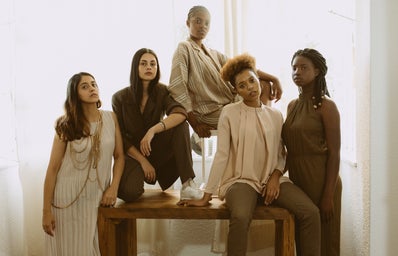The colour of the black alluvial soil seeped through my bones and spilled through the cracks of my skin – I hold the earth within me; my dark skin is beautiful, yet society constantly perpetuates the opposite. I am shunned, my skin tone ridiculed. My dark skin, apparently, is equivalent to being less worthy than the rest. In the eyes of society, my higher level of melanin that shows on my skin will always stop me from being as attractive as others. This is colourism. It means that the color of one’s skin is the basis of prejudice, with darker skin tones seen as inferior and deserving of degradation. Lighter skin is perceived as the ultimate beauty standard that one should strive to attain; the definition of beauty has thus been forced into two divisions and upheld religiously through generations.
Though colourism affects both men and women, the issue is more prominent towards the latter. The toxic injection of the ‘fair is greater’ mindset into the minds of young girls exposes them to discrimination on a wider scale. Our girls grow up being spoon-fed unrealistic ideals, taught that their own skin color is something that should bring them worry, and a part of themselves that they should change if it fails to fit what society has deemed as superior. Not only are they being constantly reminded of these ideals, they also have countless products thrown before them all with one aim: to change their skin colour.
One such cosmetic product is Fair & Lovely, an Indian skin-lightening cream which contains melanin suppressor, niacinamide as its main active ingredient. Their advertisements usually portray a similar plot – the dark-skinned girl is miserable and when she looks in the mirror, she can’t help but pick at her dark skin, visibly upset. Then she is recommended a skin-lightening cream by a friend and when she applies it, her mood instantly lifts and her problems are now all gone.
Why and how, you may wonder?
Her skin is now fair, which clearly means her life would be better off. What these products inevitably do is perpetuate the notion that dark skin is undesirable, to the extent that the removal of it can even improve one’s life. Hindustan Unilever Limited research made claims that back this ideology, finding that “90 per cent of Indian women want to use whiteners because it is aspirational, like losing weight. A fair skin is, like education, regarded as a social and economic step up.” If one reflects on this rationally, there is no need for there to be a connection between one’s skin colour and their life status, yet this finding reflects a very shocking and unsettling reality that holds the potential to destroy many lives. After backlash that their product is promoting negative stereotypes around darker skin tones, Unilever has now renamed their product to ‘Glow & Lovely’. The name may have changed, but this flawed societal perception still taints the world. All this said, I now have a question to ask society: why do you ask me to apply skin-lightening cream on my skin – do I have to erase my true self away to finally be enough for you?
Skin colour based discrimination has been deeply rooted in the South Asian community for far too many years. At home, it manifests as whispers among the older women commenting on how being fair denoted an ease in finding a partner, poisoning the minds of girls and pressuring them to do all they can to change their skin tone so they will have a better chance for a relationship. On the working front, it is seen through industries giving dark skinned individuals less significant roles to their lighter counterparts. Every act of discrimination, small or big, on the grounds of one’s skin colour is a sickening reminder of the prejudice on dark skinned individuals – this has to stop.
Colourism is strongly rife and we as a community need to continue the fight to uproot these false beliefs. We must step up and educate for no one should be made to feel that their skin tone dictates their life, because the truth is this aspect holds no true power. Achievements and opportunities are unique to the individuals and their capabilities, whether they are dark or fair is immaterial. The process of dismantling these beliefs has begun but there is a long road ahead before society fully recognises and accepts that colourism brings far more harm than good, and that it does not have a place in a civilization that is growing and advancing. For now, here is a mantra that everyone should know by heart: the colour of one’s skin is never a measure of one’s worth.
Words By: Harsheni Maniarasan
Edited By: Laura Murphy



